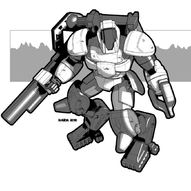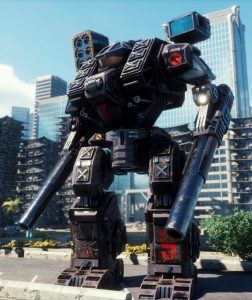Thunderbird (Battle Armor)

| |
| Thunderbird Battle Armor | |
| Production information | |
|---|---|
| Manufacturer | Barcella Battle Armor Facility |
| Production Year | 3086[1] |
| Use | Armored Infantry Infantry Fire Support |
| Weight Class | Heavy |
| Tech Base | Clan |
| Introduced | |
| Technical specifications | |
| Mass | 1,500 kg |
| Top Speed | 10 km/h |
| Jump Range | 90 m |
| Armament | |
| Armor Type | Standard |
| BV (2.0) | 50[2] |
Description
The Thunderbird was created by Clan Nova Cat as a replacement Heavy Battle Armor. Its development started in the mid-3080s as a needed replacement for their Touman's dwindling supply of frontline Elemental Battle Armor.
The Nova Cats' supply of Elemental Suits had been rapidly been depleted due to its Abjuration in 3060 and the late conflicts of the Jihad. Development of the suit started when Khan Santin West firmly pressed his Technician and Scientist Castes to create a replacement suit in 3084. The Thunderbird first saw combat in October 3085, where it was deployed in combat in a Battle Armor Trinary with the 489th Assault Cluster. A combined arms raiding force of Inner Sphere Standard Battle Armor and 'Mechs raided Labrea where the 489th was stationed. The Thunderbirds of the Trinary showed their mettle with other Nova Cat Battle Armor troops. The design remained exclusively the Nova Cats' property despite inquires by various allies.[3]
The DCMS used information gathered from its evaluations of the Thunderbird for its own Kishi and Oni battle armor.[4]
Weapons and Equipment
The Thunderbird's main weapons are interchangeable due to its Modular Weapon Mount in its right arm. The Module allows for two slots of equipment and weapons to be mounted. The armor's standard weapons layout is geared towards anti-infantry role, with a single AP Gauss Rifle with 20 rounds of ammunition. A Vibro Claw is found in its left hand allowing for the armor to latch onto friendly OmniMechs and other vehicles.
The Armor's other qualities include a Jump Booster for added mobility and 250 kilograms of Standard Armor.[5]
Variants
- ER Small Laser
- This version carries an ER Small Laser and enough energy for 20 rounds of fire. - BV(2.0)=58[6]
- Small Pulse Laser
- This version carries a Small Pulse Laser and enough energy for only 14 rounds of fire. - BV(2.0)=52[7]
- Upgrade (ER Small Laser)
- In the Dark Age era, the Thunderbird was equipped with Reflective Armor. This version carries an ER Small Laser. BV (2.0) = 71[8]
- Upgrade (Pulse Laser)
- This version also uses Reflective Armor and is equipped with a Small Pulse Laser. BV (2.0) = 65[9]
- Upgrade (BA LB-X)
- This version uses a Battle Armor LB-X autocannon and is protected by Reflective Armor. BV (2.0) = 62[10]
- Thunderbird II Battle Armor
- Produced on Shitara for The Republic of the Sphere, the Thunderbird II battle armor is an upgrade of the Thunderbird battle armor produced by Clan Nova Cat expats. The modular weapons mount of the original were replaced with a Detachable Weapon Pack in each arm. The left arm carries a single AP Gauss Rifle while the right arm carries a Battle Armor LB-X autocannon. Reflective armor protects the Thunderbird II. What makes it so deadly in the Republic Armed Forces is the integrated Battle Armor C3 system. BV (2.0) = 66[11]
References
- ↑ MUL online date for the Thunderbird (Battle Armor)
- ↑ Technical Readout: 3085 Supplemental, p. 45 - BV for the Thunderbird Battle Armor.
- ↑ Technical Readout: 3085 Supplemental, p. 44 - Thunderbird's background info.
- ↑ Technical Readout: 3145 Draconis Combine, p. 4, 6
- ↑ Technical Readout: 3085 Supplemental, pp. 44-45 - Thunderbird's weapons and stat information.
- ↑ Technical Readout: 3085 Supplemental, p.45 - BV2 for Small Laser.
- ↑ Technical Readout: 3085 Supplemental, p.45 - BV2 for Small Pulse Laser.
- ↑ Record Sheets: 3145 New Tech, New Upgrades, p. 26
- ↑ Record Sheets: 3145 New Tech, New Upgrades, p. 28
- ↑ Record Sheets: 3145 New Tech, New Upgrades, p. 27
- ↑ Experimental Technical Readout: Republic, Volume 2, p. 16


